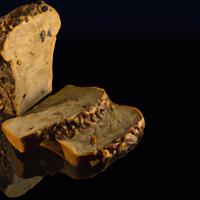
1 serving (38 grams) contains 110 calories, 4.0 grams of protein, 2.5 grams of fat, and 18.0 grams of carbohydrates.

Log this food in SnapCalorie

Nutrition Information
Calories |
687.5 | ||
|---|---|---|---|
% Daily Value* |
|||
| Total Fat | 15.6 g | 20% | |
| Saturated Fat | 3.1 g | 15% | |
| Polyunsaturated Fat | 0 g | ||
| Cholesterol | 0 mg | 0% | |
| Sodium | 1062.5 mg | 46% | |
| Total Carbohydrates | 112.5 g | 40% | |
| Dietary Fiber | 18.7 g | 66% | |
| Sugars | 12.5 g | ||
| protein | 25 g | 50% | |
| Vitamin D | 0 mcg | 0% | |
| Calcium | 125.0 mg | 9% | |
| Iron | 7.5 mg | 41% | |
| Potassium | 375.0 mg | 7% | |
* Percent Daily Values are based on a 2,000 calorie diet. Your daily values may be higher or lower depending on your calorie needs.
Food Attributes
Source of Calories
About Slice of seeded bread
A slice of seeded bread is a wholesome option made from flour, water, yeast, and a mix of nutritious seeds such as sunflower, flax, sesame, or pumpkin. Originating from European baking traditions, seeded bread is a staple in many cuisines, prized for its hearty texture and earthy, nutty flavor. Packed with fiber from whole grains and seeds, it supports healthy digestion and helps keep you feeling full longer. The seeds are rich in healthy fats, vitamins, and minerals like magnesium and zinc, making this bread a nutrient-dense choice. However, depending on the recipe, some versions may contain added sugars or higher sodium levels, so checking the label is essential. Perfect for sandwiches or toast, seeded bread offers a balance of taste and nutrition suitable for a variety of diets.



